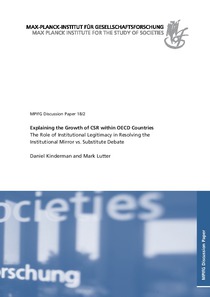Explaining the growth of CSR within OECD countries: the role of institutional legitimacy in resolving the institutional mirror vs. substitute debate
"Two strands of literature have emerged to explain the rise of a new form of private governance, Corporate Social Responsibility (CSR). One camp argues that CSR expansion is likely during periods of economic liberalization because CSR tends to substitute for growing institutional voids and a la...
| Main Authors: | , |
|---|---|
| Institution: | ETUI-European Trade Union Institute |
| Format: | TEXT |
| Language: | English |
| Published: |
Köln
2018
MPIfG |
| Subjects: | |
| Online Access: | https://www.labourline.org/KENTIKA-19399509124911177819-explaining-the-growth-of-CSR-w.htm |
| Summary: | "Two strands of literature have emerged to explain the rise of a new form of private governance, Corporate Social Responsibility (CSR). One camp argues that CSR expansion is likely during periods of economic liberalization because CSR tends to substitute for growing institutional voids and a lack of social regulation. The other camp argues that CSR is likely to diffuse within coordinated economies because it mirrors these institutional settings. While both camps find empirical support for their arguments, no one has yet managed to combine both perspectives. In our study, we develop three hypotheses based on two (rationalist and constructivist/sociological) strands of institutional theory. Based on a new dataset comprising the corporate membership in business-led CSR organizations in over thirty countries from 1981 to 2008, we show that economic liberalization has a strong effect on CSR expansion when the legitimacy of CSR is low. However, when the practice has achieved substantial cultural acceptance, economic liberalization no longer drives CSR expansion. In this setting, CSR expansion is most likely to occur within socially regulated economic contexts. " |
|---|---|
| Physical Description: | 27 p. Digital |

